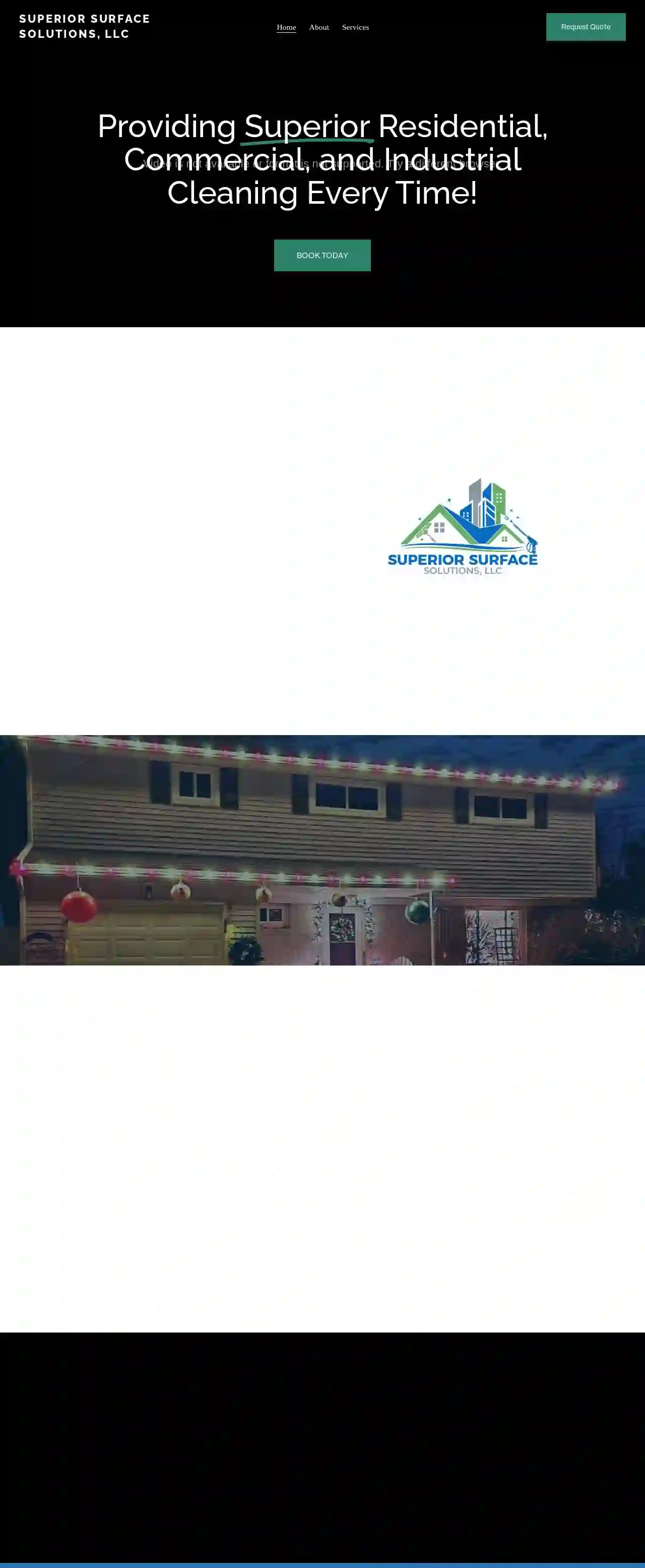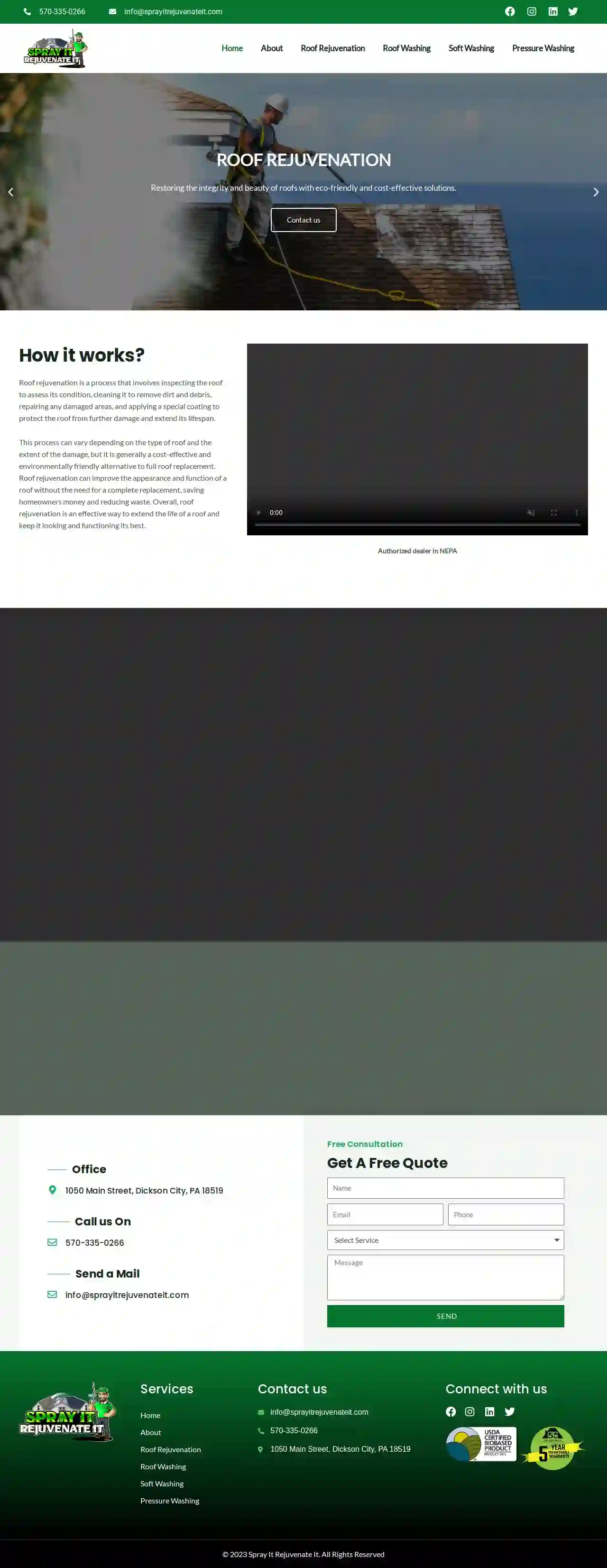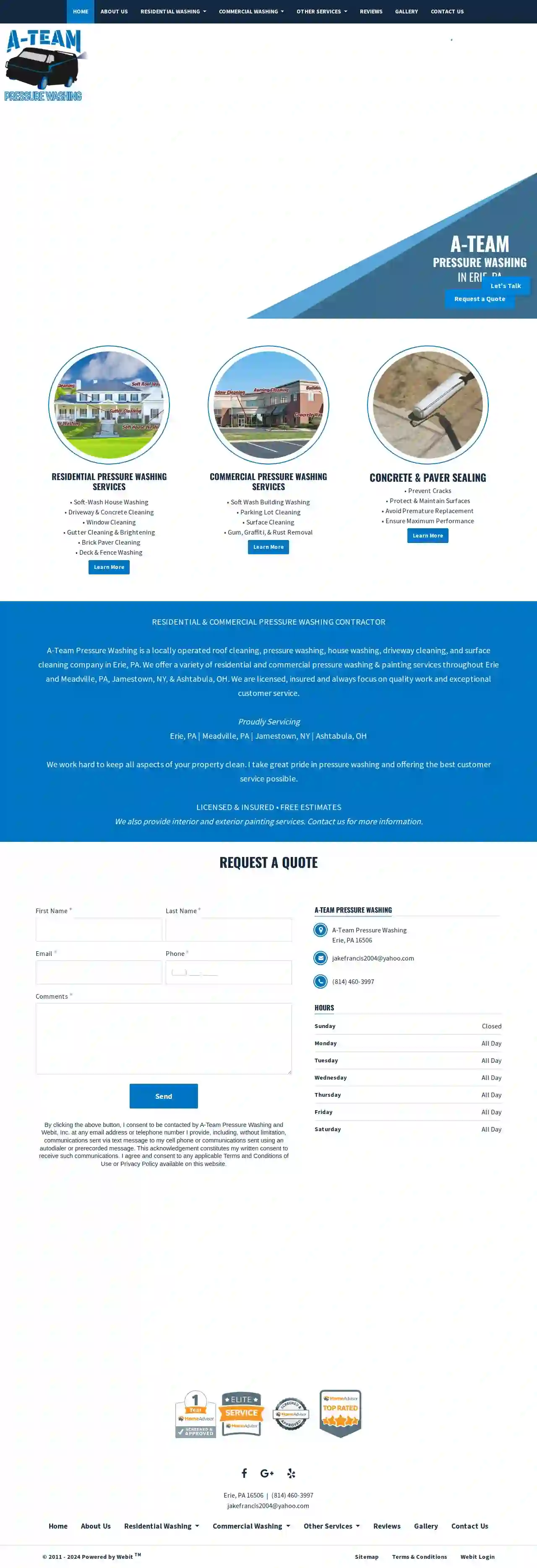Pressure Washing Redstone
Top Power Washing in Redstone
Receive multiple Power Washing quotes for your project today! Compare profiles, reviews, accreditations, portfolio, etc... and choose the best offer.

Superior Surface Solutions, LLC
534 reviewsErie, USSuperior Surface Solutions’ main goal is to be the best pressure washing company in all of Northwestern Pennsylvania. In order to be the best, you have to be the most professional. That means being certified, licensed, and insured. Superior's employees are perfecting their craft each and every day with constant research and training. Along with our work, we are a customer first company. Our communication is quick, responsive, and very friendly. Like our customer service our prices are fair and honest. We Offer Holiday Lighting! Installation, removal, storage and much more. To view a complete list of our amazing services in your area, click the link below! We provide a numerous amount of different pressure washing and sealing services. Along with gutter cleaning, window washing, and underground landscape drain cleaning. The final service we provide is unlike the rest. Superior installs Christmas lights. In addition to all of our other home perfecting services, we also hang, remove, and store lights for local residents and businesses in the area. We are constantly changing and improving to provide superior home perfecting services. Customer happiness and satisfaction is our main priority as we grow our company within the extraordinary community of Erie.
- Services
- Why Us?
- Testimonials
- Gallery
Get Quote
Long Island Pro-Wash Pressure Washing
519 reviews807 Willow Rd, Franklin Square, 11010, USLI Pro-Wash is a pressure washing company that offers superior cleaning services for homes, businesses, and outdoor spaces. We use eco-friendly solutions and customized solutions to exceed customer expectations. Our team is committed to delivering high-quality workmanship, using eco-friendly products and techniques, and providing outstanding customer service. We strive to be a leader in the pressure washing industry by continuously improving our skills, knowledge, and equipment, and by staying up-to-date with the latest trends and best practices.
- Services
- Why Us?
- Testimonials
- Gallery
Get Quote
ProMobile Hydro Cleaning
511 reviewsScranton, USCommercial cleaning is more than just bleach in a bucket. There are safety protocols and standards to be met in order to ensure all jobs are done properly and thoroughly for the safety of anyone entering the site. All of our technicians are fully certified and trained to handle any environment, from hospitals to biohazard spills. For us, when it comes to health and safety, there's no room for error. ProMobile Hydro Cleaning Company is a reputable cleaning service provider that specializes in hydro cleaning services. They offer a wide range of services, including pressure washing, steam cleaning, and hydro-jetting for residential, commercial, and industrial properties. With a team of experienced professionals and state-of-the-art equipment, ProMobile Hydro Cleaning Company ensures high-quality and efficient cleaning solutions for their clients. In an effort to limit damage to the environment, we have all of our technicians certified by the Cleaning Management Institute (CMI) in the latest methods and products of green cleaning available. Your Business is Ours We promise quality, reliable cleaning service every time so our loyal customers feel special. We work hard to be the best. Our products are high-quality and safe. And we focus on the details, so you have a clean, orderly office every time.
- Services
- Why Us?
- Gallery
Get Quote
Penn Clean Pressure Washing
587 reviews1828 Pennland Ct, Lansdale, 19446, USExperience unparalleled cleanliness with our premier pressure washing services in the Greater Philadelphia area! At Penn Clean Pressure Washing, our team specializes in revitalizing both residential and commercial properties, ensuring they look their best year-round. We offer a comprehensive range of services, including metal building cleaning, roof cleaning using soft washing methods, and residential and commercial drone cleaning. Our advanced techniques and eco-friendly solutions guarantee effective and safe cleaning, removing dirt, grime, and stains without damaging surfaces. Trust us to enhance your property's curb appeal, prolong its lifespan, and provide a healthier environment. Choose us for your pressure washing needs and see why we're the top choice for homeowners and businesses across Philadelphia!
- Services
- Why Us?
- Gallery
Get Quote
Outdoor Works LLC
524 reviewsShelby, 28152, USOutdoor Works LLC is a veteran-owned and operated pressure washing company serving Shelby, NC, and surrounding areas. We are dedicated to enhancing your outdoor spaces with expert knowledge, modern machinery, and environmentally friendly practices. Our comprehensive pressure washing services include residential home washing, gutter cleaning, roof washing, sidewalk pressure cleaning, concrete patio power washing, driveway pressure washing, and commercial building washing. We also offer additional services such as graffiti removal, Christmas lights installation, and deck pressure washing. Our team is highly trained and dedicated to providing a personalized and thorough service, ensuring enhanced external aesthetics for your property. We cater to both residential and commercial needs, transforming storefronts, driveways, decks, and home exteriors to a fresh, polished look. Contact us today at (828) 748-5269 to experience the transformative power of professional pressure washing services.
- Services
- Why Us?
- Gallery
Get Quote
Spray It Rejuvenate It
1050 Main Street, Dickson City, 18519, USSpray It Rejuvenate It is a leading provider of practicing innovative and environmental bio-friendly roof solutions and exterior home cleaning solutions. Our company specializes in roof rejuvenation services, which is an alternative to costly and wasteful roof replacements. Our team is committed to delivering exceptional customer service and top-quality results that leave your roof and the exterior of your home looking like new. We also offer a range of additional services, including roof washing, soft washing, pressure washing, and exterior cleaning, to help you maintain your property’s curb appeal and overall value. Our Mission Spray It Rejuvenate It educates and provides sustainable, affordable, and effective roofing solutions by preventative and maintenance practices. Our innovative approach aims to set new standards for excellence and transform the industry through customer satisfaction. Our Vision Spray It Rejuvenate It aims to be the top eco-friendly roofing and exterior cleaning provider in the NEPA PA area. By investing in research, expanding services, and building relationships, we strive to shape the future of roof rejuvenation, soft washing, and preventative maintenance and make a positive impact on the world. Our Future Spray it Rejuvenate It is working on future licensing for drone operations to softwash, roof rejuvenate, and future work solutions. Why Choose Us Quality Material Quality materials for lasting performance, backed by trusted suppliers. Quick Response Rapid response times for efficient and effective solutions. Trained Workers Highly skilled and trained workers for roof rejuvenation and soft wash solutions.
- Services
- Why Us?
- Gallery
Get Quote
Big Time Wash Pros
524 reviews609 1/2 ELM ST, Bridgeville, 15017, USCome Clean Big Time! Get Your Free Quote Today! At Big Time Wash Pros LLC, we offer pressure washing service to Bethel Park and surrounding communities. We're honored to have the opportunity to work with so many local residential and commercial clients. It's a privilege to help keep our local area spotless and clean, one property at a time. Exterior surface cleaning is necessary for routine maintenance for homes and businesses. However, it's also a commonly forgotten task that can lead to severe problems far beyond just a lack of curb appeal. Please familiarize yourself with our company so you can reap the benefits of knowing a reliable resource in the area for high-quality pressure cleaning. Learn More Our area is full of rich history, and residents here have such a sense of pride in being from here. We're just doing our part to help property owners maintain their homes and local businesses, keeping them looking good and in tip-top condition. Our pressure washing is a vital part of any proper maintenance plan. Don't make the mistake of attempting to do your own power washing or hiring a company with less than stellar credentials. Always go with the Big Time Wash Pros LLC, and you'll never be disappointed with the outcome of the cleaning. We clean safely and extensively to get results that garner the highest praise from our satisfied customers.
- Services
- Why Us?
- Accreditations
- Testimonials
- Gallery
Get Quote
Wash Wizard Pressure Washing
510 reviewsExeter, 18643, USIf you're a discerning homeowner who understands the importance of first impressions, then you know that the exterior of your home is just as important as the interior. A clean and well-maintained exterior not only enhances your home's curb appeal but also helps to maintain its value. This is where Wash Wizard Pressure Washing comes in. We specialize in providing top-quality house washing services that are tailored to meet the needs of discerning homeowners like you. Our team of experienced professionals uses the latest equipment and techniques to remove dirt, grime, and other pollutants from your home's exterior surfaces, leaving them looking fresh and clean. Our house washing services are designed to be gentle yet effective, ensuring that your home is thoroughly cleaned without causing any damage to your property. We use eco-friendly cleaning solutions that are safe for your family, pets, and the environment, and we take great care to ensure that our work is always done to the highest standards. At Wash Wizard Pressure Washing, we understand that your home is your most significant investment, and we are committed to helping you protect and maintain it. Our house washing services are an essential part of your home's regular maintenance routine, and they can help to extend the life of your exterior surfaces, preventing costly repairs down the line. So if you're a discerning homeowner who understands the importance of quality and first impressions, then choose Wash Wizard Pressure Washing for all your house washing needs. Our team is dedicated to providing the highest level of service and professionalism, and we are confident that you will be thrilled with the results. Contact us today to schedule your appointment and experience the Wash Wizard difference. Save with service contracts You can save as much as 30% with a yearly maintenance contract. Having your home cleaned yearly will keep it looking its best all year long. Free Estimate
- Services
- Why Us?
- Gallery
Get Quote
A-Team Pressure Washing
4.985 reviewsErie, 16506, USA-Team Pressure Washing is a locally operated company in Erie, PA, specializing in roof cleaning, pressure washing, house washing, driveway cleaning, and surface cleaning. They serve Erie and surrounding areas including Meadville, PA, Jamestown, NY, and Ashtabula, OH. The company is committed to providing quality work and exceptional customer service. They offer a variety of residential and commercial pressure washing and painting services. A-Team Pressure Washing is licensed, insured, and provides free estimates.
- Services
- Why Us?
- Our Team
- Testimonials
- Gallery
Get Quote
A&S Power Washing, LLC
525 reviews123 Main St, Suite 101, Nazareth, 18064, USA&S Power Washing, LLC is a locally owned and operated power washing company that takes pride in delivering exceptional cleaning services to both residential and commercial clients. With 15 years of industry experience, our team is highly skilled in power washing, soft washing, paver cleaning, and fleet vehicle cleaning. We understand the importance of a clean and well-maintained exterior, and we are dedicated to providing the highest quality services to meet our clients' needs.
- Services
- Why Us?
- Accreditations
- Our Team
- Testimonials
- Gallery
Get Quote
Over 60,241+ Janitorial Services in our network
Our cleaning contractors operate in Redstone & beyond!
CleaningMatch has curated and vetted Top Cleaning Services arround Redstone. Find a trustworthy pro today.
Frequently Asked Questions About Pressure Washing
- Wear Protective Gear: Wear safety glasses, closed-toe shoes, and long pants to protect yourself from flying debris and water spray.
- Never Point the Nozzle at Yourself or Others: High-pressure water can cause serious injuries. Always point the nozzle away from yourself, others, and pets.
- Use Caution on Ladders: If working on a ladder, ensure it is stable and secure. Avoid overreaching or leaning too far to one side.
- Be Mindful of Electrical Hazards: Keep water away from electrical outlets, wiring, and appliances.
- Follow Manufacturer's Instructions: Always read and follow the pressure washer manufacturer's instructions for safe operation and maintenance.
- Annually: Pressure washing your house at least once a year helps remove accumulated dirt, grime, and other contaminants, keeping it looking its best.
- Every 2-3 Years: If you live in an area with high humidity, heavy tree cover, or frequent exposure to pollutants, more frequent pressure washing may be necessary.
- When Visible Dirt and Grime Appear: Address visible dirt, stains, or mold growth promptly to prevent them from becoming more challenging to remove.
- Pressure Washing: If your siding is in good condition but dirty or stained, pressure washing can effectively restore its appearance without the need for painting.
- Painting: If your siding is faded, chipped, peeling, or damaged, pressure washing alone may not be sufficient. Painting provides a fresh coat of protection and a new look.
- Pressure Washing Before Painting: Pressure washing is an essential step before painting, as it removes dirt, grime, and loose paint, creating a clean surface for the new paint to adhere to.
- Spring and Fall: Spring and fall are often ideal for pressure washing as the temperatures are moderate and the weather is typically dry.
- Summer: Pressure washing can be done in the summer, but avoid doing so during the hottest part of the day to prevent the cleaning solutions from drying too quickly and leaving streaks.
- Winter: Pressure washing is possible in the winter, but be mindful of freezing temperatures that can affect cleaning solutions and cause slippery surfaces.
What are some safety precautions to take when pressure washing?
Prioritizing safety when pressure washing protects you and others from potential injuries or accidents.
How often should I pressure wash my house?
Regular pressure washing can maintain your home's exterior, extend the lifespan of your siding, and enhance its curb appeal.
Is it better to pressure wash or paint my house?
Assess the condition of your siding and your desired outcome to determine whether pressure washing, painting, or a combination of both is the best approach.
What is the best time of year for pressure washing?
Choose a day with mild temperatures and dry weather for optimal pressure washing results. Avoid pressure washing in extreme heat, freezing temperatures, or rainy conditions.
What are some safety precautions to take when pressure washing?
- Wear Protective Gear: Wear safety glasses, closed-toe shoes, and long pants to protect yourself from flying debris and water spray.
- Never Point the Nozzle at Yourself or Others: High-pressure water can cause serious injuries. Always point the nozzle away from yourself, others, and pets.
- Use Caution on Ladders: If working on a ladder, ensure it is stable and secure. Avoid overreaching or leaning too far to one side.
- Be Mindful of Electrical Hazards: Keep water away from electrical outlets, wiring, and appliances.
- Follow Manufacturer's Instructions: Always read and follow the pressure washer manufacturer's instructions for safe operation and maintenance.
Prioritizing safety when pressure washing protects you and others from potential injuries or accidents.
How often should I pressure wash my house?
- Annually: Pressure washing your house at least once a year helps remove accumulated dirt, grime, and other contaminants, keeping it looking its best.
- Every 2-3 Years: If you live in an area with high humidity, heavy tree cover, or frequent exposure to pollutants, more frequent pressure washing may be necessary.
- When Visible Dirt and Grime Appear: Address visible dirt, stains, or mold growth promptly to prevent them from becoming more challenging to remove.
Regular pressure washing can maintain your home's exterior, extend the lifespan of your siding, and enhance its curb appeal.
Is it better to pressure wash or paint my house?
- Pressure Washing: If your siding is in good condition but dirty or stained, pressure washing can effectively restore its appearance without the need for painting.
- Painting: If your siding is faded, chipped, peeling, or damaged, pressure washing alone may not be sufficient. Painting provides a fresh coat of protection and a new look.
- Pressure Washing Before Painting: Pressure washing is an essential step before painting, as it removes dirt, grime, and loose paint, creating a clean surface for the new paint to adhere to.
Assess the condition of your siding and your desired outcome to determine whether pressure washing, painting, or a combination of both is the best approach.
What is the best time of year for pressure washing?
- Spring and Fall: Spring and fall are often ideal for pressure washing as the temperatures are moderate and the weather is typically dry.
- Summer: Pressure washing can be done in the summer, but avoid doing so during the hottest part of the day to prevent the cleaning solutions from drying too quickly and leaving streaks.
- Winter: Pressure washing is possible in the winter, but be mindful of freezing temperatures that can affect cleaning solutions and cause slippery surfaces.
Choose a day with mild temperatures and dry weather for optimal pressure washing results. Avoid pressure washing in extreme heat, freezing temperatures, or rainy conditions.